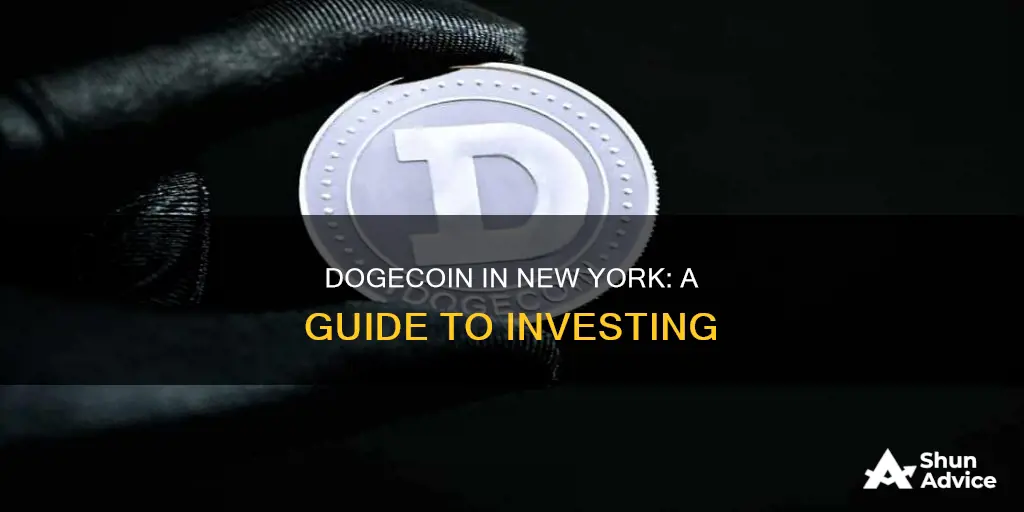
Dogecoin is a unique cryptocurrency born out of the popular Doge meme, featuring a Shiba Inu dog. In New York, there are some challenges to investing in Dogecoin due to the state's strict regulations for crypto exchanges. New York requires crypto exchanges to obtain a BitLicense to service its residents, which has resulted in many popular exchanges like Binance US, Kraken, and Crypto.com not serving New Yorkers. However, there are still some options available for those looking to invest in Dogecoin in the state. One popular option is Robinhood, although the app does not allow users to transfer cryptocurrencies to other wallets. Another option is AnchorUSD, which allows users to purchase Dogecoin and offers a free high-yield savings account. Additionally, New Yorkers can use Coinbase, one of the few exchanges that serve the state, to purchase Stellar Lumens (XLM) and then swap it for Dogecoin using the Atomic Wallet app. It is important to note that investing in cryptocurrencies like Dogecoin carries significant risks due to its volatile nature, and individuals should carefully consider these risks before investing.
| Characteristics | Values |
|---|---|
| How to buy Dogecoin in New York | Download the Coinbase app and the Atomic Wallet app |
| Purchase Stella Lumens (XLM) from Coinbase | |
| Send XLM to Atomic Wallet | |
| Swap XLM for DOGE | |
| Alternative platforms | AnchorUSD, Robinhood, Gemini, Public, Kraken, Paybis, Uphold |
| Dogecoin's price | Largely based on speculation |
| No unique utility in the digital currency and payments space | |
| Inflationary currency | |
| No maximum limit to the number of coins in circulation | |
| Significant price fluctuation |
What You'll Learn

Dogecoin in New York: The legal landscape
New York has a unique set of regulations for cryptocurrencies, including Dogecoin, which can make it challenging for residents to buy, sell, or trade these digital assets. The state's attempt to 'control' crypto and protect its citizens has resulted in a regulatory environment that some exchanges find too onerous to navigate. As a result, many popular exchanges, such as Binance US, Kraken, and Crypto.com, do not serve New York residents.
The BitLicense Requirement
One of the key reasons for the limited options for New Yorkers is the BitLicense requirement. The BitLicense, issued by the New York Department of Financial Services (NYDFS), is a license that government-approved firms must obtain to provide cryptocurrency services in the state. The approval process for the BitLicense is lengthy and costly, with application costs of up to $100,000. Businesses must also comply with strict New York regulations, including anti-money laundering laws and cybersecurity regulations.
Available Exchanges for New Yorkers
Despite the challenges, there are a few exchanges that cater to New York residents. These include:
- Coinbase: One of the largest exchanges in the US, Coinbase has over 100 million users and offers a free wallet for its users. However, at the time of writing, Dogecoin cannot be purchased directly on the platform. Users need to purchase another cryptocurrency, such as Stellar Lumens (XLM), and then swap it for Dogecoin using a third-party wallet like Atomic Wallet.
- Robinhood: This app allows New Yorkers to buy and sell Dogecoin, but it does not support transferring cryptocurrencies to other wallets.
- AnchorUSD: This app enables users to purchase Dogecoin, trade stocks, and access a high-yield savings account. Dogecoin can be transferred out of AnchorUSD into a cold or hot wallet.
- Gemini: A New York-based exchange open to US residents and several other countries.
While the regulatory landscape in New York may pose some challenges for those looking to invest in Dogecoin, it is not impossible. New Yorkers can use the available exchanges to purchase and trade Dogecoin, but they may need to take additional steps, such as using multiple platforms and wallets.
Dogecoin Investing: A Guide for Indians
You may want to see also

How to buy Dogecoin in New York
Step 1: Get a Dogecoin Wallet
Before purchasing Dogecoin, it is necessary to set up a Dogecoin wallet to store your cryptocurrency. There are several types of wallets to choose from, including hardware wallets and software wallets.
Hardware wallets, such as the Ledger Nano S and Nano X, are considered one of the safest options as they keep the private key to your Dogecoin offline on a physical device. However, they do require an initial investment. On the other hand, software wallets are typically free but may be more vulnerable to malware. Examples of software wallets include MultiDoge, Exodus, and Coinomi.
Step 2: Locate Your Dogecoin Address
Your Dogecoin address is a long string of letters and numbers that starts with a capital "D" followed by a number or another capital letter. This address is essential for sending and receiving Dogecoin.
Step 3: Find a Doge Exchange
Finding a reputable exchange to purchase Dogecoin can be challenging as only a handful of vetted exchanges support buying Doge with Dollars or Euros. Here are some of the options available:
- Binance: A leading cryptocurrency exchange that supports the purchase of over 200 cryptocurrencies. Binance allows users to buy Dogecoin with various traditional currencies and payment methods.
- Bitpanda: An Austrian exchange that allows residents of the EU and a few other countries to buy Dogecoin through multiple payment methods.
- Uphold: A New York-based platform offering trading for cryptocurrencies, commodities, equities, and fiat currencies. Uphold does not have trading fees, but there are hidden spreads for each trade.
- EToro: A platform that allows users to exchange Dogecoin for fiat currency (USD, EUR, etc.). eToro is less recommended for withdrawing and using the actual coins.
- Kraken: A US exchange that allows users to deposit funds via credit card or wire transfer. Kraken uses the XDG ticker symbol for Dogecoin, which differs from the widely accepted DOGE symbol.
- Changelly: One of the few places that allow purchasing Dogecoin with almost any currency (fiat or crypto). However, Changelly can be expensive, especially when buying Dogecoin with a credit card.
- Gemini: A New York-based exchange founded by the Winklevoss twins. Gemini offers instant purchases using a bank card, as well as fiat currency deposits through wire transfers or ACH.
- Bittrex: A US-based cryptocurrency exchange that offers a DOGE/BTC pair, meaning users need to buy or deposit Bitcoin to exchange it for Dogecoin.
- Coinbase: A regulation-friendly, US-based cryptocurrency exchange that has been around since 2012. Users can easily buy Dogecoin on Coinbase using a linked credit card or bank account.
It is worth noting that some exchanges, such as Binance, do not allow New York residents. Therefore, it is important to verify that the chosen exchange supports your location before proceeding.
Step 4: Withdraw Your Dogecoin
Once you have purchased Dogecoin on the exchange, it is recommended to withdraw the coins into your Dogecoin wallet. This reduces the risk of losing your cryptocurrency if the exchange is hacked or goes bankrupt.
Additional Buying Options
For those looking for alternative ways to buy Dogecoin, here are some options:
- Credit/Debit Card, Wire, or Crypto: Using a credit or debit card is one of the easiest ways to buy Dogecoin, although it usually comes with higher fees than a bank transfer.
- PayPal: There are very few exchanges that accept PayPal payments. One option is to use LocalCoinSwap to buy Bitcoin with PayPal and then transfer the Bitcoin to Changelly to trade it for Dogecoin.
- Faucets: A faucet is a site that provides small amounts of Dogecoin for free to get you started. Dogefaucet.com and InDogWeTrust.com are popular faucet sites.
Important Considerations
When buying Dogecoin or any other cryptocurrency, it is essential to remember that the value can fluctuate sharply. Therefore, it is crucial to do your research and monitor the markets closely before investing. Additionally, it is important to treat any investment advice with caution and only invest what you can afford to lose.
Lastly, due to regulatory requirements, New York-based exchanges and crypto service providers are highly regulated, making it challenging for New Yorkers to find platforms that allow them to trade cryptocurrencies.
The Bitcoin Millionaires: Fortunes of the Crypto Investors
You may want to see also

Dogecoin wallets: Hot vs cold
When it comes to Dogecoin wallets, there are two main categories: hot wallets and cold wallets. The main difference between the two is that hot wallets are connected to the internet, while cold wallets are not.
Hot Wallets
Hot wallets are generally considered to be more convenient and accessible than cold wallets. They can come in the form of mobile apps, browser extensions, downloadable software, or exchange-based wallets. Hot wallets are usually free and easy to set up, making them a popular choice for crypto enthusiasts. They also offer the convenience of being able to access and manage your funds on the go.
However, hot wallets are typically less secure than cold wallets since they are constantly connected to the internet, which provides more opportunities for hackers to breach the security of the wallet.
Cold Wallets
Cold wallets, on the other hand, offer a higher level of security since they are not connected to the internet. They are often used for storing larger amounts of crypto or for long-term holdings. Cold wallets can come in the form of hardware wallets or paper wallets. While they provide greater security, cold wallets usually come with a higher price tag and may have a steeper learning curve for those new to crypto.
When choosing between a hot or cold wallet for Dogecoin, it's important to consider your own needs and preferences. If you value convenience and accessibility, a hot wallet may be the better choice. On the other hand, if security and peace of mind are your top priorities, a cold wallet could be the way to go. Ultimately, many people choose to use a combination of hot and cold wallets to suit their different needs.
Bitcoin Buying vs Investing: What's the Difference?
You may want to see also

How to sell Dogecoin in New York
Selling Dogecoin in New York is not as straightforward as in some other places due to the state's strict cryptocurrency regulations. However, it is still possible to sell Dogecoin in New York, and there are a few methods you can use. Here is a step-by-step guide:
Using a Crypto Exchange:
One way to sell Dogecoin in New York is through a cryptocurrency exchange that operates in the state. One of the few exchanges that New Yorkers can use is Coinbase. Here are the steps to follow:
- Sign up for a Coinbase account if you don't already have one.
- Verify your account and complete any necessary Know Your Customer (KYC) requirements.
- Deposit your Dogecoin into your Coinbase account.
- Navigate to the "Sell" section of the platform.
- Choose the amount of Dogecoin you want to sell and place a sell order.
- Withdraw your funds in USD to your bank account or debit card.
Note that Coinbase may have certain restrictions on selling Dogecoin, so be sure to check their platform for the most up-to-date information.
Using a Peer-to-Peer Platform:
Another option for selling Dogecoin in New York is through a peer-to-peer (P2P) platform. These platforms allow you to connect directly with buyers who want to purchase your Dogecoin. Here are the general steps:
- Choose a reputable P2P platform that operates in New York, such as LocalBitcoins or Paxful.
- Sign up for an account and complete any necessary verification processes.
- Create a sell order by specifying the amount of Dogecoin you want to sell and your preferred payment method (e.g., bank transfer, cash, or stablecoins).
- Wait for a buyer to accept your offer.
- Once the buyer sends the payment, release the Dogecoin to their wallet.
Using a Dogecoin Debit Card:
If you hold Dogecoin in a crypto wallet, you may be able to sell it indirectly by using a Dogecoin debit card. These cards allow you to spend your Dogecoin anywhere that accepts debit card payments. Here's how it works:
- Find a platform that offers a Dogecoin debit card, such as BitPay or Crypto.com.
- Sign up for an account and link your crypto wallet to the card.
- When you make a purchase with the debit card, the platform will automatically convert your Dogecoin into fiat currency to complete the transaction.
- You can then use the funds in your account to make purchases or withdraw them to your bank account.
Using a Third-Party App:
In the past, some New Yorkers have reported using third-party apps like AnchorUSD to buy and sell Dogecoin. These apps may offer more flexibility than traditional exchanges. Here are the steps:
- Download and install the AnchorUSD app on your device.
- Complete the account setup and verification process.
- Deposit your Dogecoin into the app.
- Use the app to sell your Dogecoin and withdraw the funds to your bank account or another wallet.
Note: The ability to buy and sell Dogecoin on AnchorUSD may change over time, so be sure to check their platform for the most current information.
Important Considerations:
- Regulatory Environment: New York has strict regulations for cryptocurrency exchanges, which has led to many popular exchanges not serving New York residents. Always ensure that the platform you choose complies with New York state laws.
- Taxes: When you sell Dogecoin or any other cryptocurrency, you may be subject to capital gains taxes. Be sure to consult with a tax professional to understand your tax obligations and how to report your crypto transactions.
- Volatility: Cryptocurrencies like Dogecoin are highly volatile, and their value can fluctuate significantly. Always consider your risk tolerance and invest only what you can afford to lose.
- Security: When selling Dogecoin, prioritize using secure platforms that have implemented robust security measures to protect your funds.
Bitcoin: Should You Invest?
You may want to see also

Dogecoin derivatives: CFDs and futures
Dogecoin derivatives are financial products that derive their value from the price of Dogecoin. They allow investors to speculate on the price movements of Dogecoin without actually owning the underlying asset. The two main types of Dogecoin derivatives are contracts for difference (CFDs) and futures contracts.
Contracts for Difference (CFDs)
CFDs are financial contracts between a buyer and a seller that stipulate that the buyer must pay the seller the difference between the current value of an asset and its value at the time the contract is made. In the context of Dogecoin, a CFD would involve a trader paying the difference between the open and closing trade prices of Dogecoin, without any delivery of physical goods or securities. CFDs are typically traded over-the-counter (OTC) through a network of brokers and are not traded on major exchanges such as the New York Stock Exchange (NYSE). They are considered an advanced trading strategy used by experienced traders and are not allowed in the United States.
The advantages of CFDs include the ability to access the underlying asset at a lower cost, ease of execution, and the ability to take a long or short position. However, there are also risks associated with CFDs, including weak industry regulation, potential lack of liquidity, and the need to maintain an adequate margin.
Futures Contracts
Dogecoin futures contracts are another type of derivative that allow traders to speculate on the price of Dogecoin at a future date. Futures contracts are standardized agreements to buy or sell an asset at a preset price on a future date. In the case of Dogecoin, a futures contract would involve agreeing to buy or sell a certain amount of Dogecoin at a specific price on a specific date. Dogecoin futures contracts are available for trading on platforms like Binance Futures, which offers up to 50x leverage on these contracts.
Trading Dogecoin futures contracts can provide opportunities for both long and short positions, depending on the expected direction of the price movement. For example, if a trader expects the price of Dogecoin to increase, they can enter into a long position by buying a futures contract. On the other hand, if a trader expects the price to decrease, they can enter into a short position by selling a futures contract.
It is important to note that trading Dogecoin derivatives, such as CFDs and futures contracts, involves significant risks due to the volatile nature of the cryptocurrency market. Traders should carefully consider their investment objectives, level of experience, and risk tolerance before engaging in such speculative investments.
Acorns and Bitcoin: Invest in Crypto via the App?
You may want to see also







